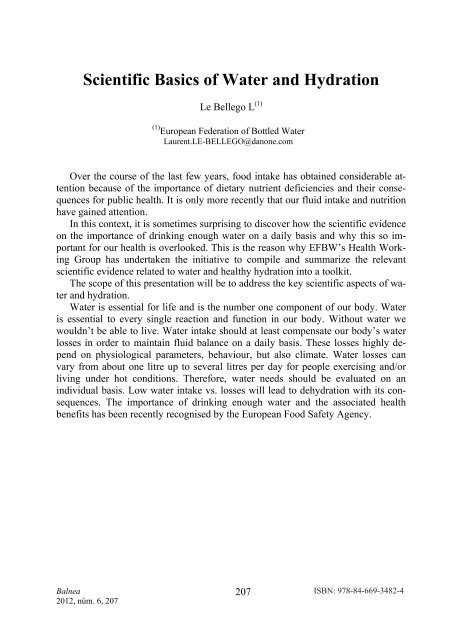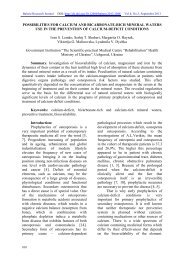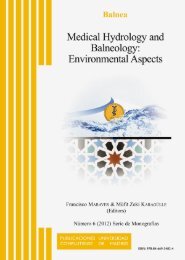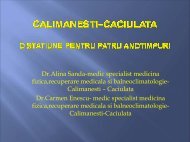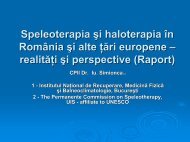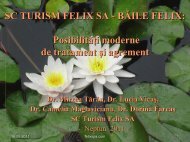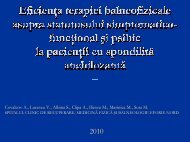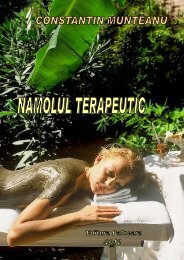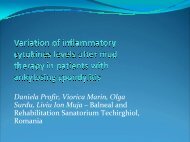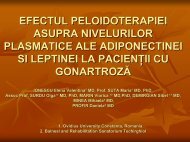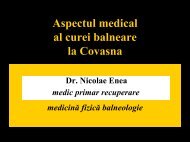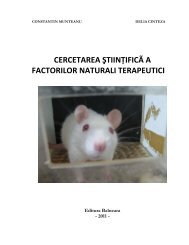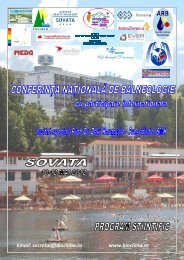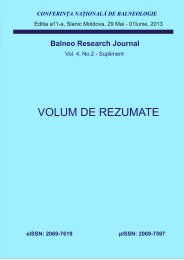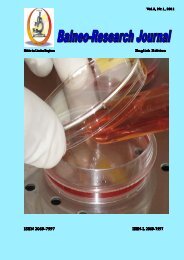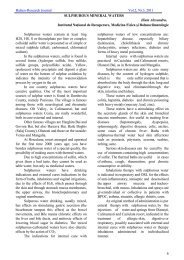- Page 1 and 2:
Balnea ISSN: 978-84-669-3482-4 Núm
- Page 3 and 4:
Balnea 2012, Núm. 6, 9-24 Contents
- Page 5 and 6:
Balnea 2012, Núm. 6, 9-24 Contents
- Page 7 and 8:
Balnea 2012, Núm. 6, 9-24 Contents
- Page 9 and 10:
Balnea 2012, Núm. 6, 9-24 Contents
- Page 11 and 12:
Posters Papers Balnea 2012, Núm. 6
- Page 13 and 14:
Balnea 2012, Núm. 6, 9-24 Contents
- Page 15 and 16:
Balnea 2012, Núm. 6, 9-24 Contents
- Page 17 and 18:
38 th World Congress of the Interna
- Page 19 and 20:
38 th World Congress of the Interna
- Page 21 and 22:
Honorary Committee Honorary Preside
- Page 23:
PROGRAMME
- Page 26 and 27:
34 Medical Hydrology and Balneology
- Page 29:
SCIENTIFIC SESSIONS
- Page 33 and 34:
What’s new in Balneology? Karagü
- Page 35 and 36:
Balneology in Europe: results of a
- Page 37 and 38:
Balneology Research in Germany Gute
- Page 39 and 40:
Balneology Research in France Roque
- Page 41:
The State of art - Session 01 Lectu
- Page 44 and 45:
Medical Hydrology and Balneology: E
- Page 46 and 47:
Health resort therapy (spa therapy)
- Page 48 and 49:
The State of art, Health Resort Med
- Page 50 and 51:
State of the art, Health Resort Med
- Page 52 and 53:
The State of the art, Health Resort
- Page 55 and 56:
Impact of sulphurous water endotymp
- Page 57 and 58:
Balnea 2012, núm. 6, 64-65 Medical
- Page 59 and 60:
Balnea 2012, núm. 6, 66-67 Medical
- Page 61 and 62:
Balnea 2012, núm. 6, 68-69 Medical
- Page 63 and 64:
Balnea 2012, núm. 6, 70-71 Medical
- Page 65 and 66:
Balnea 2012, núm. 6, 72-73 Medical
- Page 67 and 68:
Balnea 2012, núm. 6, 74-75 Medical
- Page 69 and 70:
Balnea 2012, núm. 6, 76-77 Medical
- Page 71:
Methodology of Scientific Investiga
- Page 74 and 75:
Medical Hydrology and Balneology: E
- Page 76 and 77:
Medical Hydrology and Balneology: E
- Page 78 and 79:
Medical Hydrology and Balneology: E
- Page 80 and 81:
Medical Hydrology and Balneology: E
- Page 82 and 83:
Medical Hydrology and Balneology: E
- Page 84 and 85:
Effectiveness the treatments with n
- Page 86 and 87:
Building a preventive medicine mode
- Page 89:
Climatotherapy - Thalassotherapy -
- Page 92 and 93:
Medical Hydrology and Balneology: E
- Page 94 and 95:
Is Thalassotherapy simply a type of
- Page 96 and 97:
Assessment of the impact of weather
- Page 98 and 99:
Marine zootherapy as part of thalas
- Page 100 and 101:
Thalassotherapy and otaridotheraphy
- Page 102 and 103:
Thalasso medical centre in the salt
- Page 104 and 105:
Acute atopic dermatitis and balneot
- Page 106 and 107:
Change of the psoriasis area and se
- Page 109:
Climatotherapy - Dead Sea - Session
- Page 112 and 113:
Ultra-violet (UV) radiation propert
- Page 114 and 115:
Climatotherapy of skin diseases at
- Page 116 and 117:
Medical Hydrology and Balneology: E
- Page 118 and 119:
Medical Hydrology and Balneology: E
- Page 120 and 121:
Influence of single immersion in De
- Page 123:
New Trends 2 - Session 06 Lectures
- Page 126 and 127:
Medical Hydrology and Balneology: E
- Page 128 and 129:
Implementing comprehensive care cli
- Page 130 and 131:
Results 138 Medical Hydrology and B
- Page 132 and 133:
Medical Hydrology and Balneology: E
- Page 134 and 135:
Medical Hydrology and Balneology: E
- Page 136 and 137:
Medical Hydrology and Balneology: E
- Page 138 and 139:
Medical Hydrology and Balneology: E
- Page 140 and 141:
148 Medical Hydrology and Balneolog
- Page 142 and 143:
Thermophysical study of peat from t
- Page 145:
Société Française de Médecine T
- Page 148 and 149: Therapeutic education programs for
- Page 150 and 151: Metabolic Syndrome: education progr
- Page 152 and 153: Development of a therapeutic progra
- Page 154 and 155: Therapeutic education for patients
- Page 156 and 157: Withdrawal from benzodiapezines in
- Page 159 and 160: A proposal for a glossary of peloid
- Page 161 and 162: Biophysical skin effects of peloids
- Page 163 and 164: Mud cure in Russia: history, achiev
- Page 165 and 166: Clinical effects of mud-bath therap
- Page 167 and 168: Impact of peloidotherapy on hystolo
- Page 169 and 170: Impact of Mud Therapy in pathogenes
- Page 171 and 172: Effects of mud-bath applications on
- Page 173 and 174: Chondrogenic effect of the sulphuri
- Page 175 and 176: Balneotherapy and mud-therapy in kn
- Page 177: Biology - Session 09 Lectures Vetri
- Page 180 and 181: Medical Hydrology and Balneology: E
- Page 182 and 183: Which is better for health promotio
- Page 184 and 185: Heat-shock protein 70 is affected b
- Page 186 and 187: A possible physiological mechanism
- Page 188 and 189: Thermal changes of fingers after co
- Page 190 and 191: Case study: geochemical transformat
- Page 192 and 193: Hydrogen sulfide as an anti-inflama
- Page 194 and 195: Determination of selenium in minera
- Page 196 and 197: Medical Hydrology and Balneology: E
- Page 200 and 201: Effects of drinking Spa Therapy on
- Page 202 and 203: Drinking mineral waters, preventing
- Page 204 and 205: Health Effects of Natural Mineral W
- Page 206 and 207: The Bahia 2011 Seniors study. patte
- Page 208 and 209: Migration assays for the identifica
- Page 210 and 211: Changes in diuresis after rehydrati
- Page 212 and 213: Nitrates in spanish waters: natural
- Page 214 and 215: Medical Hydrology and Balneology: E
- Page 217 and 218: Sustainable Tourism and environment
- Page 219 and 220: A geochemical approach to explain g
- Page 221 and 222: Water mineralization origin inferre
- Page 223 and 224: Mineral waters in Azores islands: h
- Page 225: New Trends 3 - Session 12 Lectures
- Page 228 and 229: Medical Hydrology and Balneology: E
- Page 230 and 231: Medical Hydrology and Balneology: E
- Page 232 and 233: A new thermal treatment center is p
- Page 234 and 235: Medical Hydrology and Balneology: E
- Page 236 and 237: Importance of the natural factor, t
- Page 239 and 240: New Trends 4 - Dermo-cosmetological
- Page 241 and 242: Balneary Research in Romania - a sw
- Page 243 and 244: Does modern thermal medicine need n
- Page 245 and 246: Evaluation of the efficacy of exfol
- Page 247 and 248: Development and characterization of
- Page 249 and 250:
Efficacy of a designed peloid with
- Page 251 and 252:
Treatment of varicose veins: experi
- Page 253 and 254:
Introducing BANA: “Balneotherapy
- Page 255 and 256:
Analysis of the neuromuscular activ
- Page 257:
Halotherapy in Rehabilitation of Pa
- Page 261 and 262:
Health Resort Medicine in Italy and
- Page 263 and 264:
FEMTEC and ISMH: a Global Alliance
- Page 265 and 266:
Cardiovascular risk factors in pati
- Page 267 and 268:
Evolution of social thermalism prog
- Page 269 and 270:
Thermal resorts of the Roman world
- Page 271:
Balnea 2012, núm. 6, 278-279 Medic
- Page 275 and 276:
The psychiatry showers in the ninet
- Page 277 and 278:
Water Journeys (II): Granada Spas a
- Page 279 and 280:
Hippolytus´ house: a roman medical
- Page 281 and 282:
Long-term effects of psoriasis trea
- Page 283 and 284:
Balneology Research in Spain Marave
- Page 285:
Miscellaneous - 2 - Session 16 Lect
- Page 288 and 289:
Medical Hydrology and Balneology: E
- Page 290 and 291:
Medical Hydrology and Balneology: E
- Page 292 and 293:
Medical Hydrology and Balneology: E
- Page 294 and 295:
Medical Hydrology and Balneology: E
- Page 296 and 297:
Medical Hydrology and Balneology: E
- Page 298 and 299:
Medical Hydrology and Balneology: E
- Page 301:
Biology P1 Omega-6-eicosanoid may b
- Page 304 and 305:
Medical Hydrology and Balneology: E
- Page 306 and 307:
Medical Hydrology and Balneology: E
- Page 308 and 309:
Medical Hydrology and Balneology: E
- Page 310 and 311:
Medical Hydrology and Balneology: E
- Page 312 and 313:
Medical Hydrology and Balneology: E
- Page 314 and 315:
Medical Hydrology and Balneology: E
- Page 316 and 317:
Bromine chemistry applied to swimmi
- Page 318 and 319:
Medical Hydrology and Balneology: E
- Page 321 and 322:
Does balneology still have gynecolo
- Page 323 and 324:
Balnea 2012, núm. 6, 330-331 Medic
- Page 325 and 326:
Balnea 2012, núm. 6, 332-333 Medic
- Page 327 and 328:
Balnea 2012, núm. 6, 334-335 Medic
- Page 329 and 330:
Balnea 2012, núm. 6, 336-337 Medic
- Page 331 and 332:
Balnea 2012, núm. 6, 338-339 Medic
- Page 333 and 334:
Balnea 2012, núm. 6, 340-341 Medic
- Page 335 and 336:
Balnea 2012, núm. 6, 342-343 Medic
- Page 337 and 338:
Balnea 2012, núm. 6, 344-345 Medic
- Page 339 and 340:
Balnea 2012, núm. 6, 346-347 Medic
- Page 341 and 342:
Balnea 2012, núm. 6, 348-349 Medic
- Page 343 and 344:
Balnea 2012, núm. 6, 350-351 Medic
- Page 345 and 346:
Balnea 2012, núm. 6, 352-353 Medic
- Page 347 and 348:
Balnea 2012, núm. 6, 354-355 Medic
- Page 349 and 350:
Analysis of the neuromuscular activ
- Page 351 and 352:
Spa, hydrotherapy’s treatment, an
- Page 353 and 354:
Quality of life and thermal cure Ma
- Page 355 and 356:
How does obesity affect the effecti
- Page 357 and 358:
Land Based or Hidrotherapy: which i
- Page 359 and 360:
Balnea 2012, núm. 6, 366-367 Medic
- Page 361 and 362:
Balnea 2012, núm. 6, 368-369 Medic
- Page 363 and 364:
Balnea 2012, núm. 6, 370-371 Medic
- Page 365 and 366:
A retrospective investigation of sp
- Page 367:
P34 Magnesium waters from Serbia T
- Page 370 and 371:
Medical Hydrology and Balneology: E
- Page 372 and 373:
Medical Hydrology and Balneology: E
- Page 375 and 376:
Mud Therapy P37 Thermotherapy appli
- Page 377 and 378:
Thermotherapy applications in spani
- Page 379 and 380:
Ultramicrofabric SEM-IA of peloids
- Page 381 and 382:
Study of the liquid phase of peloid
- Page 383 and 384:
Effect of pelotherapy on the percep
- Page 385 and 386:
Effect on cinebalneoterapia functio
- Page 387 and 388:
Serum levels of adiponectin and vis
- Page 389 and 390:
Ultramicrofabric SEM of extemporane
- Page 391 and 392:
Mud therapy for the treatment of os
- Page 393 and 394:
Balnea 2012, núm. 6, 400-401 Medic
- Page 395 and 396:
Balnea 2012, núm. 6, 402-403 Medic
- Page 397:
Balnea 2012, núm. 6, 404-405 Medic
- Page 401 and 402:
Effects of Thalassotherapy on the c
- Page 403 and 404:
Cardiorespiratory response to Thala
- Page 405 and 406:
Talassotherapy on stroke rehabilita
- Page 407 and 408:
Beneficial effects of Thalassothera
- Page 409 and 410:
The Thalassotherapy in Mexico a the
- Page 411 and 412:
Hydrogeochemical, medical and biocl
- Page 413 and 414:
Cleaning effects for the hair and t
- Page 415 and 416:
Study of a cosmetologic salt produc
- Page 417 and 418:
Miscellaneous P57 Demographic analy
- Page 419 and 420:
Demographic analysis of the IMSERSO
- Page 421 and 422:
Balnea 2012, núm. 6, 428-429 Medic
- Page 423 and 424:
Balnea 2012, núm. 6, 430-431 Medic
- Page 425 and 426:
Balnea 2012, núm. 6, 432-433 Medic
- Page 427 and 428:
Balnea 2012, núm. 6, 434-435 Medic
- Page 429 and 430:
Balnea 2012, núm. 6, 436-437 Medic
- Page 431 and 432:
Balnea 2012, núm. 6, 438-439 Medic
- Page 433 and 434:
Balnea 2012, núm. 6, 440-441 Medic
- Page 435 and 436:
Balnea 2012, núm. 6, 442-443 Medic
- Page 437 and 438:
Balnea 2012, núm. 6, 444-445 Medic
- Page 439 and 440:
Archaeology and Healing Spas: a val
- Page 441 and 442:
Contribution to study conditions of
- Page 443 and 444:
Application of geochemical modellin
- Page 445 and 446:
Balneological use of thermal water
- Page 447 and 448:
Thermal therapy in health: categori
- Page 449:
Recent contributions of the Geologi
- Page 452 and 453:
Carvalho MR: 231 Casás I: 136 Cast
- Page 454 and 455:
Jurjec J: 110 Karagülle M: 55, 133
- Page 456 and 457:
Rodríguez-Carballeira M: 183, 436,


